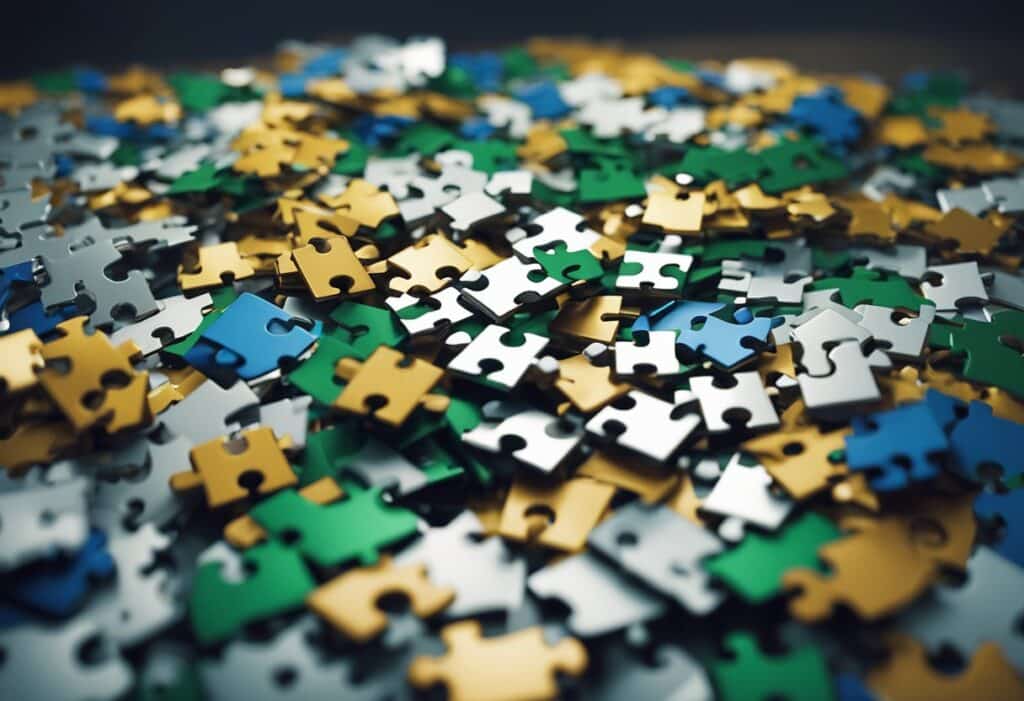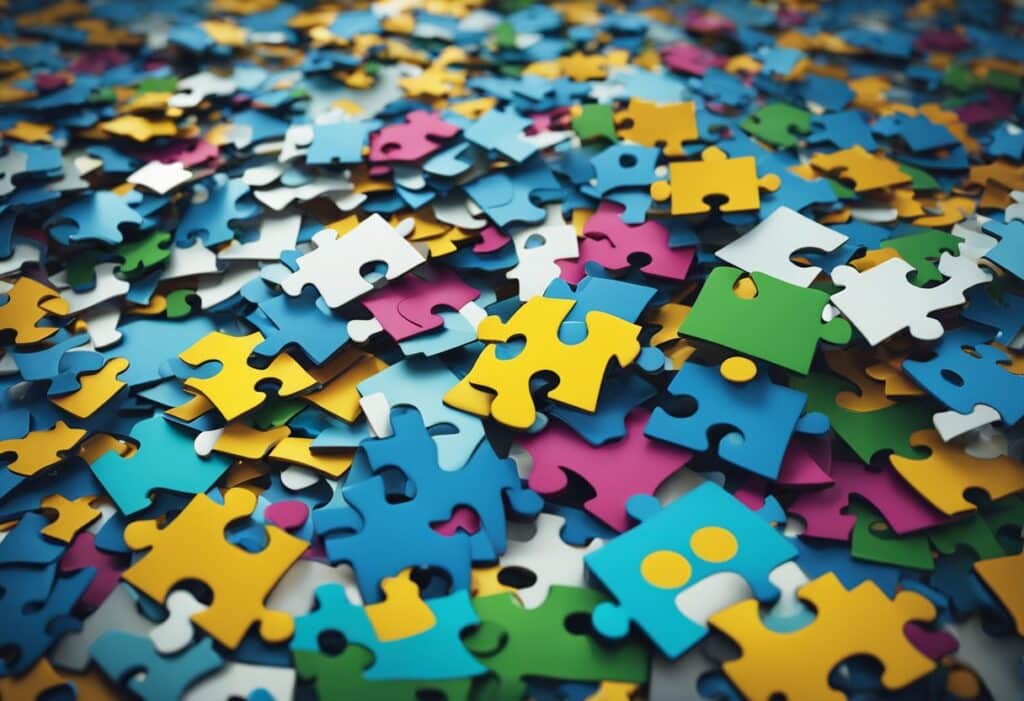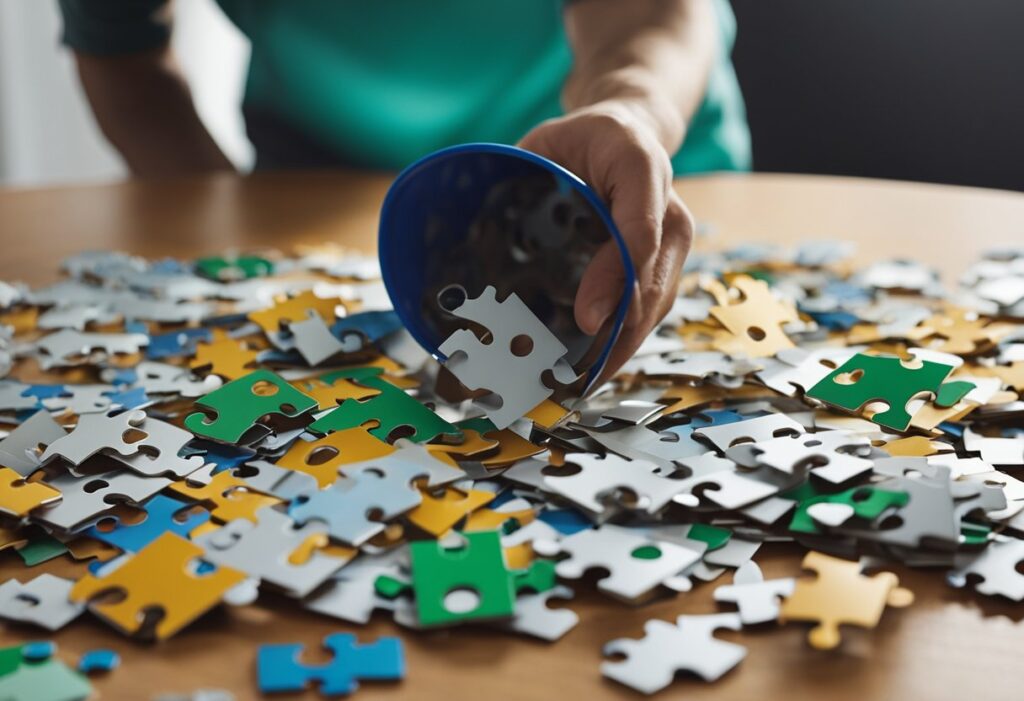Last Updated on February 23, 2024 by JigsawPuzzleGuru
Table of Contents
Unveiling Eco-friendly Possibilities
Jigsaw puzzles provide entertainment and cognitive benefits, but with increasing awareness of environmental sustainability, the question “can puzzles be recycled?” becomes pertinent. Typically made of cardboard and paper, a standard jigsaw puzzle consists of a multitude of interlocking pieces. The materials suggest a potential for recycling, similar to how one might recycle cardboard boxes or paper products. However, the recycling process for jigsaw puzzles can be complicated by factors such as the type of adhesive used to layer the image onto the cardboard and the inclusion of any special finishes on the pieces.

When considering the recyclability of jigsaw puzzles, it’s important to recognize that not all puzzles are created equal. Some may contain plastics or other non-paper components, which could make the recycling process more complex. Furthermore, the condition of the puzzle also plays a role; puzzles that are heavily worn or have missing pieces may not be suitable for standard recycling programs. While jigsaw puzzles represent a small fraction of the waste stream, their recyclability is an issue for consumers looking to make responsible environmental choices.
To address these concerns, some manufacturers are committing to sustainability by using recyclable materials and creating puzzles that are easier to recycle. They may use eco-friendly inks and biodegradable coatings to ensure that their products have a reduced environmental impact. Consumers, on the other hand, are encouraged to check with local recycling guidelines before tossing their puzzles in the blue bin. Some areas may accept jigsaw puzzles as part of their mixed paper recycling, while others might require consumers to seek out specialty recycling programs or consider alternative methods of reusing or repurposing their old puzzles.
Recycling Jigsaw Puzzles
Recycling jigsaw puzzles can be an excellent way to contribute to sustainability efforts. This section provides a detailed look at the recyclability of jigsaw puzzles, local recycling guidelines, and alternatives if recycling is not an option.
Understanding Recyclability
Jigsaw puzzles are typically made from cardboard or paperboard, which are recyclable materials. However, the recyclability of a puzzle can be affected if it has been treated with certain adhesives, laminates, or inks. It is important to verify if the specific materials of a puzzle are accepted by recycling centers. Individuals should check the labeling on the puzzle for recyclable symbols or contact the manufacturer for material composition.
Local Recycling Guidelines
Local recycling programs may have differing regulations about what types of paper products can be processed. To avoid contamination of the recycling stream, one should consult their local recycling guidelines. Typically, programs will list accepted materials on their website or provide information via phone. It’s crucial to follow these guidelines to ensure that puzzle pieces are recycled properly. Here’s a basic format to ascertain local rules:
- Contact Local Recycling Program: Obtain the specific guidelines for recycling paper products.
- Prepare Puzzle Pieces: Remove any non-paper components if necessary.
Alternatives to Recycling Bins
When jigsaw puzzles cannot be recycled through conventional bins, there are alternatives to consider. People might choose to donate puzzles to charity shops, schools, or community centers. Upcycling is another option, where puzzle pieces can be repurposed into artwork or educational materials. Listing the puzzle on online marketplaces or community groups for reuse also extends its life cycle and reduces waste.
By understanding the materials, adhering to local guidelines, and exploring creative alternatives, recycling or repurposing jigsaw puzzles can be achieved effectively.
Reusing Jigsaw Puzzles
Jigsaw puzzles can lead a second life through various means, such as donation or repurposing into new forms of art, decorations, or even through exchange initiatives. Here are specific ways to breathe new life into old puzzles.
Donation Options
Libraries and nursing homes often welcome donations of jigsaw puzzles as an enriching activity for guests and residents. However, it’s imperative to ensure all pieces are included. Thrift stores and charities also accept puzzle donations and can be a source of entertainment and joy for another household.
- Libraries: They frequently seek donations to expand their communal offerings.
- Nursing Homes: Puzzles can provide cognitive stimulation for the elderly.
- Thrift Stores/Charities: Donating here supports eco-friendly reuse and aids nonprofit missions.
Creative Reuses
Missing pieces in a puzzle need not render it useless. Repurposing parts of or entire puzzles to create decorations, wall art, or jewelry is an innovative way to recycle. Decorative ideas include:
- Christmas Decorations: Turn puzzle pieces into unique ornaments or wreaths.
- Wall Art: Convert completed puzzles into framed pictures.
- Jewelry: Create earrings or pendants with smaller puzzle pieces.
In each case, the end result is a one-of-a-kind item that reflects creative recycling.
Puzzle Swap Initiatives
Puzzle swap or trade events are a fantastic method for puzzle enthusiasts to exchange puzzles with others, preventing waste and fostering a sense of community. Local community centers might host such events, ensuring puzzles have a longer play-life.
| Events for Puzzle Swap | Locations |
|---|---|
| Monthly Swap Meets | Community Centers |
| Local Trade Days | Libraries |
| Online Exchange Forums | Internet Platforms |
Such initiatives encourage an eco-friendly approach to puzzle enjoyment – sharing the fun without additional production.
Environmental Impact of Puzzles

Jigsaw puzzles, a popular pastime, come with implications for the environment, particularly if not managed with waste reduction and sustainability in mind. These issues become increasingly important as the eco-conscious consumer looks for ways to enjoy products without contributing to environmental degradation.
Waste Reduction Strategies
Implementing waste reduction strategies is crucial in mitigating the environmental impact of puzzles. Consumers can reduce waste by reusing and exchanging puzzles with others instead of discarding them. For instance, donating to libraries, schools, or community centers extends a puzzle’s life cycle, keeping it out of landfills. Furthermore, utilizing recycling programs dedicated to puzzles helps divert waste from the environment. Another effective strategy includes:
- Composting: Some puzzles made from cardboard can be composted, breaking down over time and turning into eco-friendly compost material.
Sustainability in Puzzle Manufacturing
The shift towards sustainability in puzzle manufacturing reflects an awareness of environmental concerns. Manufacturers are exploring eco-friendly materials, such as:
- Recycled paper and cardboard
- Soy-based inks
- Biodegradable plastics
The production process is also evolving, with companies reducing their carbon footprint through:
- Energy-efficient machinery
- Minimal use of non-renewable resources
- Reducing emissions
By prioritizing these practices, the puzzle industry can lessen its impact and contribute positively to the environment.
Puzzle Companies Pursuing Sustainability
Several jigsaw puzzle companies are prioritizing eco-friendly practices in their manufacturing processes, demonstrating a commitment to sustainability and environmental responsibility. Here are a few notable examples:
Ravensburger:
Ravensburger is a well-known puzzle manufacturer that has made significant strides in incorporating eco-friendly practices into its operations. They use sustainably sourced materials for their puzzles, including recycled cardboard and paper, and they adhere to strict environmental standards throughout the production process. Additionally, Ravensburger is committed to minimizing waste and energy consumption in their facilities. They are pursuing a “goal to reduce our entire carbon footprint by 40%** by 2030”
Artifact Puzzles:
Artifact Puzzles specializes in creating high-quality wooden jigsaw puzzles using “sustainably harvested wood from forests”Columbia Forest Product’s PureBond formaldehyde-free maple plywood” certified by the Forest Stewardship Council (FSC). They prioritize environmental sustainability by minimizing packaging waste and using non-toxic, eco-friendly materials for their puzzles.
Eeboo:
Eeboo is another puzzle company that places a strong emphasis on sustainability and eco-friendliness. They use “90% recycled post-consumer paper materials” for their puzzles and packaging whenever possible, and they prioritize working with suppliers who share their commitment to environmental stewardship. Additionally, Eeboo’s puzzles are printed with vegetable-based inks, further reducing their environmental impact.
New York Puzzle Company:
New York Puzzle Company produces a range of puzzles featuring vintage-inspired artwork and designs. They prioritize sustainability by using recycled chipboard for their puzzles and packaging, and they strive to minimize their carbon footprint throughout the production and distribution process. In addition they claim: “With every purchase you make, 1% of the total sale goes directly to support non-profits working tirelessly to safeguard the health of our planet.”
Pomegranate:
Pomegranate is renowned for its high-quality jigsaw puzzles featuring works of art from renowned artists and museums. They are committed to sustainability and environmental responsibility, using recycled materials for their puzzles and packaging. Additionally, Pomegranate is “phasing out any packaging that includes plastic, or switching to recyclable plastics when possible” and state: “All of the printers we work with are committed to sustainability programs.”
These are just a few examples of jigsaw puzzle companies that are leading the way in adopting eco-friendly practices. By supporting these companies, puzzle enthusiasts can enjoy their favorite pastime while contributing to a more sustainable future.
Conclusion

Jigsaw puzzles present both challenges and opportunities when it comes to recycling. Typically made of cardboard and paper, they are inherently recyclable materials. However, the presence of glue and lamination can complicate the process. Recycling facilities require puzzles to be free of contaminants like excessive glue or non-paper components.
On the other hand, donating puzzles offers a sustainable alternative. This not only gives the puzzles a new life but also reduces waste. Charities, thrift stores, schools, and nursing homes often accept puzzle donations, provided they are complete and in good condition.
Consumers should consider the end-of-life options for their jigsaw puzzles:
| Option | Consideration |
|---|---|
| Recycling | Check with local facilities for materials acceptance. |
| Donating | Ensure puzzles are complete and in usable condition. |
It’s crucial that individuals are informed about the recycling policies in their area and understand the proper ways to dispose of or pass on their puzzles to minimize environmental impact.
